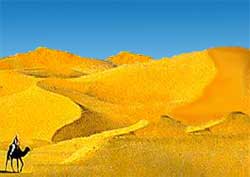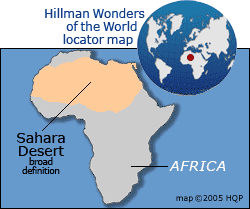



Sahara Desert
Travel tips you can trust


Why the
Sahara Desert
is special
The Sahara Desert is now about 5,000 kilometers (3,000 miles) wide and up to 2,000 kilometers (1,200 miles) from head to foot, making it roughly as big as the United States.
Sahara Desert
tips and insights
 How it came to be
How it came to be
Green vegetation blanketed the Sahara terrain 10,000 years ago, a heartbeat in geological time. Unfavorable climactic changes gradually turned this North African land into a desert of astounding size.
 Still expanding
Still expanding
The Sahara Desert is still expanding along its southern border at an alarming rate. Some blame long-term climactic trends, others point the finger at ill-advised farming and herding techniques along the Sahara Desert fringes.
 Rainfall
Rainfall
It seldom rains in most of the Sahara Desert. Some spots haven't seen a rain drop in years. But on those rare occasions when it rains, it can downpour.
 More than just sand dunes
More than just sand dunes
While most people envision the typical Sahara Desert landscape as rolling sand dunes (such as the landscape in the photo), in reality only 25% is sandy. The rest consists of geological features such as gravelly plains, parched plateaus and rocky mountains. The unifying attribute is extreme aridness, which predominantly defines the word "desert".
 Location
Location


World's Top 100 Wonders
World's Top 1000 Wonders
Site map
My credentials
About my website and criteria
Reader testimonials



